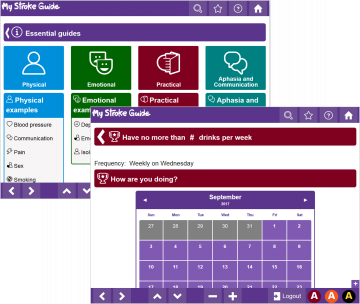Research and ideation for a new travel management platform
A corporate travel company approached System Concepts to support the development of their brand-new travel management platform. Their aim was to ...

The Stroke Association is the UK’s leading charity dedicated to conquering stroke. It provides vital support services, campaigns for better stroke care and funds research to find better treatments.
In addition to the medical research the charity undertakes, it also provides a range of information resources and support services, to help people rebuild their lives after stroke. The charity turned to us for UX research to inform the development and extension of My Stroke Guide, its digital self management tool.

Stroke Association was aiming to make My Stroke Guide, which had previously only been available to people in selected NHS areas, freely accessible to stroke survivors across the whole country. In preparation for this, it had conducted initial qualitative research that focused on how best to communicate My Stroke Guide to a wider audience. This research revealed the need to understand user needs in greater depth to optimise the site for them.
Before extending availability of its My Stroke Guide tool, Stroke Association wanted to gain deeper insight into what users – stroke survivors and their ‘inner circle’ of family and friends – wanted from My Stroke Guide, and how it could be improved to ensure maximum engagement and usefulness.

To build on the diary study, we conducted individual and contextual paired interviews with survivors and their supporters. The information gathered enabled us to build up a picture of stroke survivors’ needs, and to better understand how people go about life, post-stroke.
Our in-depth user needs report provided a detailed analysis of the research, which received positive feedback from the client. The key findings were then summarised in a presentation we used to facilitate a half day user needs workshop, attended by selected Stroke Association representatives.
In addition to providing insights on user needs, the research also delivered highly specific and in depth understanding relating to each of the main features of Stroke Association’s My Stroke Guide website. This equipped the charity to weigh the potential impact of changes, against the ease and feasibility of implementation.
The Head of Business and Insight Analysis added, “The research has also informed our long term vision, with valuable insights and greater understanding of stroke survivors. This will be incorporated into the longer term strategy of My Stroke Guide.”
Our post research workshop proved valuable to the Stroke Association, highlighting the need for certain strategic decisions to be made. Getting teams together in a room together enabled everyone to engage with the research findings much more closely, thinking beyond the day-to-day and creating a more open perspective. This proved a productive environment for agreeing priorities and assigning individual and collective actions and responsibilities. The research was also beneficial in helping the charity build the business cases for sponsorship and partnership.
Laura Richards, Head of Insight and Business Analysis, Stroke Association
A corporate travel company approached System Concepts to support the development of their brand-new travel management platform. Their aim was to ...
Our client wanted to better understand a sub-set of vulnerable customers, to build empathy and identify the crucial user needs to consider for this ...
A payment services and software provider was looking to launch a new electronic point of sale (ePOS) system within the UK. To address the breadth of ...